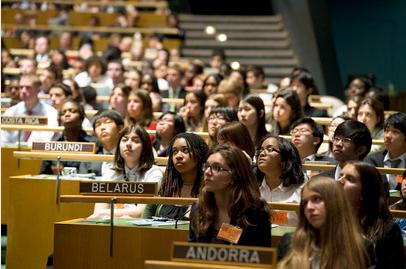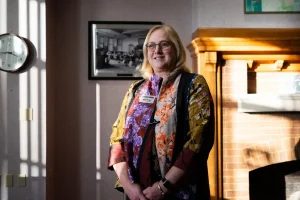Lack of budget forces sudden halt to Model UN trip

Photo credit: https://bestdelegate.com/why-general-assemblies-are-crucial-to-model-u-n/
February 8, 2019
Students in the University of Wisconsin-La Crosse’s Model United Nations (UN) course this semester found themselves receiving a shocking email on Feb. 1, announcing the cancelation of the annual New York Model UN trip due to surprise budgeting issues within the Political Science Department.
The trip, for which the planning process began approximately a year ago, would have included students having the opportunity to participate in the largest biannual Model UN Conference in the country, taking place in New York City, the home of the UN’s headquarters. Every year, students from around the globe gather together to learn more and experience what the UN is truly like. In the months before the event, the students prepare themselves as teams to represent a country. During the conference, the students are able to put their hard work to the test. According to the National Model UN Conference, “Participants in our United Nations simulations propose solutions to global concerns while gaining skills in debate, conflict resolution and compromise.”
Attending the conference was originally a requirement for students in the course, as the content of the class throughout the semester is to help the students prepare for the event.
Associate Professor Timothy Dale, department chair for UWL’s Political Science Department, was faced with the task of having to officially cancel the trip and inform the students of the cancelation.
He explained the reasoning behind the cancelation, “Any time we run any trips like this, the trips have to stay on budget, and so we collect student fees, with the students paying around $800 for this course. We found out the Saturday before the semester started that the hotel was far more expensive than we thought.
“So, when I got the budget numbers that weekend before classes started, it was clear that we were at least $8,000 over budget for the trip, meaning that we did not have $8,000 that we needed to take the students on the trip. At that time, I went to the dean and we discussed what the possibilities were for covering that money. The possibility was discussed that the students would contribute an additional amount to cover the cost. The possibility was discussed of seeking donations. The problem was that we had up until the drop deadline for the class to even confirm that the trip was even going to go, because without the confirmation you had students signed up for a class that wouldn’t know until the day of the trip if we had enough money. In that investigation, one of the things that I was reminded was that we could not charge students any more money than what they paid before.
“This is the same rule that applies to a professor halfway through the semester, the professor can’t require an additional book to be purchased that wasn’t on the original course list. In the same way, once the fee is paid, we can’t ask students for a required activity to pay additional money. It was clear that we were not going to be able to get that extra $8,000. So, it’s the responsibility of the department chair to make sure that we are fiscally responsible as a department and we could not run a trip that was going to end up being in the red. There’s no money to cover that extra cost.”
Dale explained that the class is not canceled. He noted, “The trip was canceled with enough time for the students to receive a full refund, for students to choose a different class or for students to choose to remain enrolled in that class and find a different trip.”
Dale recognized the frustration that the students faced and did his best to answer their questions by talking to them the following Monday during their class, while also offering one-on-one conversations with the students.
Junior Chelsie Miskowski, who is enrolled in the Model UN course, explained her reaction to the unexpected change of plans, “I was very disappointed and just mad, because we had been planning for this New York trip since last year, like around this time, because we did a conference and held it here called Arrowhead. Arrowhead was to fundraise for this New York trip. So, we’ve known about it for a very long time. And, so, for all of a sudden a week into class, [Dale] deciding to cancel it because of budget issues that we should have known about was very just confusing and frustrating.”
Miskowski wasn’t the only student with a strong opinion on the cancelation, as a total of 22 students in the course had to receive the unfortunate news.
Student Maxwell Meyers had a similar reaction as Miskowski to the news of no longer being able to participate in the conference, “Honestly, I was shocked, just because It was a plan for what felt like over a year. It was already starting this semester, so we all kind of thought it was going to happen. We were all very excited for it, so to get that email was pretty upsetting.”
“The New York conference is really big. It’s one of the conferences that multiple schools from out of the country attend. Being a native English speaker, you are one of the minority at the conference. So, it brings a lot of opportunity to meet people, to meet possible networking connections in New York and at the United Nations building,” Meyers said. “It sucks that we had the opportunity to take such a great advantage of our college [experience] with the Political Science department, but we’re not able to anymore.”
Last year, according to the National Model UN Conference, global citizens from 136 UN member states came to participate in the conference, which will take place both in March and April this year. Students who attended were joined by over 6,000 fellow student delegates, giving them many opportunities to connect with those who have similar interests as them but very different backgrounds.
Dale offered the possibility of a less expensive trip for the students to take, which the instructor and the students could decide upon together.
Miskowski explained the conversation that occurred following the offer, “We came up with three different options. The first option was to not do a conference and still go to New York, just as a trip for like three days, which the majority of the class wanted, because we have worked so hard to go to New York that even if we aren’t doing a conference which what the class is for which is kind of disappointing, but like we can still go and experience all of the things that would be educational in New York. Second option was to go to a conference in Charlotte, North Carolina. Then another option was that there was a conference 16 days from now in St. Louis. So those were our three options.”
The final decision was to go to New York but not to participate in the conference. Miskowski noted the possibility of touring the United Nations headquarters, having a one-on-one Q&A session with a representative of the UN, visiting embassies and meeting with different organizations that work with the UN.
In relation to the final replacement trip decision, Meyers said, “It helps a little bit that we are able to go to New York and visit the United Nations building and possibly go to some UN festivities if our cards are played right. It helps a little, but it still doesn’t really suppress the sting.”
Some students originally enrolled in the class find themselves now considering dropping the course. Meyers noted on the possibility of their departure, “That sucks because we’re all honestly like a big family in that class. We’ve been together for at least three semesters. So, it kind of sucks seeing your closer friends, which you were going to take this once-in-a-lifetime trip with, have to drop out because they can’t justify it anymore.”
Both Meyers and Miskowski hope that in the future changes of plans like this can be announced in greater advance and less suddenly.
Meyers said, “I understand, you know, classes were canceled and what not, but there could have been update emails before then. Just like, ‘Hey, here’s the situation that’s going on.’ But instead it was just that one saying the trip is canceled.”
On the future of the annual New York trip, Dale said, “Any trip that the Model UN class makes needs to be fully funded before we can plan for the trip to happen. That is, the only thing about the New York trip is that it is the most expensive trip that we can take, so the question going forward is how do we make sure that it is fully funded. It is probably going to require higher student fees for the course. But there are all of the other sources of funding that we have explored and continue to explore.”





